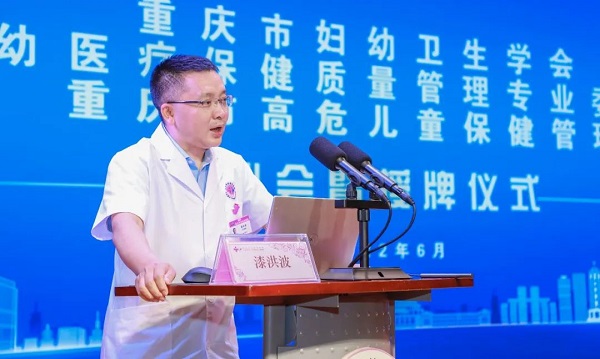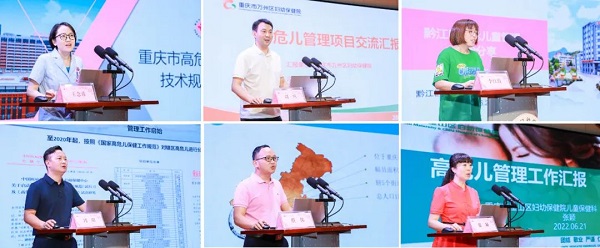Chongqing offers training in high-risk children health management

Qi Hongbo, president of the CQHCWC, addresses the Chongqing High-risk Children Health Care Management Training Conference on June 21. [Photo/CQHCWC]
The Chongqing High-risk Children Health Care Management Training Conference and an award ceremony for demonstration project units were held at the Chongqing Health Center for Women and Children (Women and Children's Hospital of Chongqing Medical University), or CQHCWC, in Southwest China's Chongqing on June 21.
Sponsored by the professional committee on the quality management of maternal and child healthcare of the Chongqing Maternal and Child Hygiene Association, the event was aimed at further standardizing the healthcare management of high-risk children and promoting their healthy growth.
Held both online and offline, the event was participated in by more than 100 people, including Qi Hongbo, president of the CQHCWC, Dan Yang, vice-president of the Chongqing Maternal and Child Hygiene Association, and representatives of maternal and child healthcare institutions in various districts and counties in the city.
The conference was presided over by Zhou Wenzheng, head of the Quality Management Department of the CQHCWC.

Representatives from demonstration project units address the event. [Photo/CQHCWC]
Studies show that the development of children before the age of 8 is very rapid and important in terms of physique, movement, language, cognition, and social emotions, especially before the age of 2, when children experience a critical period for brain development.
Comprehensive intervention in the early stages of development for high-risk children under 3 years old will significantly improve their comprehensive development. Therefore, the high-quality management of high-risk children is of great significance to comprehensively improving the health of the population.
Addressing the opening ceremony, Qi affirmed the achievements made in pilot work for the graded and classified management of high-risk children over the past year, and then put forward three requirements for the management of high-risk children, namely promoting transformation for development, strengthening basic technology and improving technical service capabilities, as well as studying the experience of economically-developed regions such as Shanghai and Shenzhen.
Dan Yang pointed out that children are the future of the nation, so ensuring the health of high-risk children is an important response to the health needs of the public. She promised that the professional committee would strengthen academic training and technical exchanges, and gradually expand the coverage of high-risk children management pilot units so as to benefit more high-risk children.

Demonstration project units are awarded at the event on June 21. [Photo/CQHCWC]
Wang Nianrong, director of the Children's Health Care Department, offered training in technical norms for the management of high-risk children, interpreting normative guidelines, and emphasizing technical points.
Representatives from various demonstration project units also shared their management experience in terms of policy guarantees, hardware support, hierarchical management, departmental cooperation, and other areas.
Maternal and child healthcare institutions in Wanzhou, Qianjiang, Changshou, Jiangjin, and Bishan districts were named demonstration project units for high-risk children healthcare management during the event.

 CQHCWC: Nurture healthier futures for children
CQHCWC: Nurture healthier futures for children How to help children develop healthy eating habits
How to help children develop healthy eating habits Wechat
Wechat Weibo
Weibo